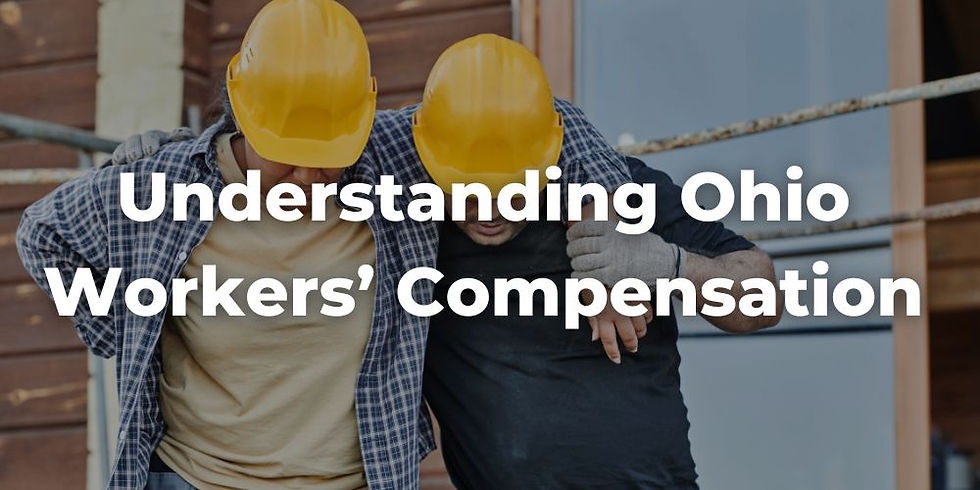Do I Qualify for Workers’ Compensation After a Slip and Fall at Work in Ohio?
- John Larrimer

- Aug 27, 2025
- 5 min read
Slip and fall incidents can cause serious injuries, and if they occur while on the job, the injured worker may be eligible to make a workers' compensation claim. A simple fall accident can happen in almost any work environment, and it can cause everything from minor soft tissue injuries to severe injuries like head trauma.
In Ohio, most employers are required to carry workers' compensation insurance, which helps to cover things like medical expenses following a workplace injury. However, qualifying for workers' comp isn't as easy as it sounds. A slip-and-fall workplace accident can be covered, but the claims process depends on a number of legal and factual considerations. Because of this, Workers' compensation attorneys are almost always necessary.
Larrimer & Larrimer is a law firm with over 90 years of experience representing injured Ohio workers. The team helps clients who suffer workplace falls by determining their eligibility and securing the benefits they deserve. They are able to answer questions like Do I qualify for workers’ compensation with a repetitive strain injury?

Understanding Ohio Workers’ Compensation and the Claims Process
The Ohio Bureau of Workers’ Compensation (BWC) is in charge of work injury claims throughout the state. Due to workers' compensation law, employers are required to maintain workers’ comp insurance either through the BWC (state fund employers) or by self-insuring their claims.
The system is no-fault, which means injured workers do not have to prove that anyone was negligent or intended to harm them. They don't put blame on anyone. Instead, they must show that:
They were an eligible employee for workers comp claims
The fall occurred in the course and scope of their job
The injury was the direct result of the workplace fall
Once those elements are established, the worker may pursue compensation injuries sustained when performing work related tasks. They can get medical coverage, lost wage benefits, and additional compensation for other related bills. If the injury was caused on the employers premises, but it can be linked to a negligent third party, such as a manufacturer of a machine used in the workplace, it's also possible to sue in court through a personal injury claim.
Who Qualifies for Workers’ Compensation in Slip and Fall Cases
To qualify for workers’ compensation benefits in Ohio, a slip and fall injury must meet several requirements.
1. Covered Employment
Only those classified as employees are eligible for benefits. For example, this includes full-time, part-time, and temporary workers. However, independent contractors, volunteers, and certain exempt workers may not qualify unless they have opted into coverage...even if the accident occurred at work.
Keep in mind, however that misclassification disputes sometimes arise. This is especially the case in industries like construction or home health care. In these circumstances, the Ohio Industrial Commission may have to determine whether the worker should be legally classified as an employee. Most cases require a lawyer.
2. Injury Must Occur Within the Scope of Employment
The fall must occur while the employee is performing work-related duties or engaging in activities reasonably connected to their job. Some examples of this include:
In hallways, kitchens, or restrooms at the workplace
On stairwells or loading docks
On wet floors in office lobbies
On icy or snow covered sidewalks maintained by the employer in winter
All of these types of slip and fall injuries are generally considered compensable. However, falls that occur while commuting to work, when running personal errands, or during unauthorized breaks may not be covered. Also, injuries sustained when under the influence of drug or alcohol use will also not be covered.
3. Timely Reporting and Documentation
The injured worker is responsible for reporting the fall to their supervisor or employer as soon as possible, and then seek medical attention. Delays in reporting illnesses or injuries, or gaps in treatment, can lead to claim denial. The injured person must also notify the BWC via a First Report of Injury (FROI) form within the legal time limits.
Common Slip and Fall Hazards in the Workplace
Many workplace environments — even those that seem relatively safe — can present fall hazards. Common causes of slip and fall accidents include:
Wet or freshly mopped floors without warning signs
Loose carpeting or floor mats
Icy sidewalks or unshoveled entryways
Cluttered walkways or poor lighting
Unsecured ladders or staircases
Oil, grease, or chemical spills
Uneven flooring or broken tiles
These hazards are particularly dangerous in fast-paced or high-traffic environments like hospitals, warehouses, retail stores, and construction sites.
Dealing with this is often difficult, and many workers have financial needs to cover the cost of their care. This is why it's so important to talk to a legal expert. Resources are available, and representation is always advisable in these cases.
What Slip and Fall Injuries Are Covered?
The type and severity of the injury play a role in the scope of available benefits. Covered injuries include:
Broken bones or fractures
Concussions or traumatic brain injuries
Sprains and torn ligaments
Spinal cord or back injuries
Hip or knee injuries
Lacerations or bruises requiring medical care
In some cases, falls may lead to permanent disability or long-term mobility issues. All such injuries, when caused by a fall during the course of employment, may qualify for workers’ compensation in Ohio.
Why Slip and Fall Accidents Are Sometimes Denied
Despite the clear risks, some fall-related claims are denied by the BWC or contested by employers. Common reasons include:
Claim that the injury occurred off the clock or outside the scope of employment
Lack of witnesses or surveillance footage to verify the fall
Failure to report the injury promptly
Pre-existing conditions cited as the actual cause of injury
Accusations of horseplay, intoxication, or intentional conduct
These denials do not necessarily end the case. Ohio workers have the right to appeal denied claims through the Ohio Industrial Commission, where additional evidence and medical testimony can be presented.
Available Benefits for Qualifying Workers
When a slip and fall claim is approved, the injured worker may receive several types of benefits under Ohio law, including:
Medical care coverage (hospital visits, surgery, physical therapy)
Temporary Total Disability (TTD) for time missed from work
Wage loss compensation for reduced hours or lower-paying modified work
Permanent Partial Disability (PPD) for lasting impairment
Vocational rehabilitation if unable to return to the previous job
In the most severe cases, injured workers may be entitled to lump-sum settlements or long-term disability benefits.
How Larrimer & Larrimer Helps With Slip and Fall Claims
Slip and fall cases may appear straightforward but often involve complex legal questions, insurance company pushback, and the need for thorough documentation. Larrimer & Larrimer assists injured workers throughout the entire process by:
Evaluating whether the fall meets Ohio’s criteria for workers’ compensation
Coordinating with medical providers to obtain expert opinions
Preparing and filing all necessary documents with the BWC
Representing injured workers in hearings and appeals
Fighting for the full amount of benefits the worker is entitled to receive
With decades of experience handling fall-related claims, the best workers comp law firm in Columbus Ohio might ensure no critical evidence or deadline is overlooked.

Work with an Experienced Attorney - Get a Free Consultation
Slip and fall accidents can happen in any workplace and often lead to serious, life-disrupting injuries. Under Ohio law, most employees who suffer such injuries while performing their job duties are entitled to workers’ compensation benefits — but eligibility depends on factors like when, where, and how the fall occurred.
If a fall injury occurred at work, it is essential to report the incident, seek medical treatment, and understand legal rights under the workers’ compensation system. Having an experienced law firm like Larrimer & Larrimer on the case can make the difference between a denied claim and a full recovery of benefits.
For personalized legal help after a workplace fall, contact Larrimer & Larrimer to schedule a free consultation. Call now.
.png)



Πρόσφατα δοκίμασα την πλατφόρμα του Hugo Casino και η εμπειρία μου ήταν θετική. Η ποικιλία παιχνιδιών είναι εντυπωσιακή, με πάνω από 5.000 επιλογές που κρατούν το ενδιαφέρον ζωντανό. Η πλοήγηση είναι εύκολη και γρήγορη, ενώ η ασφάλεια που παρέχει η άδεια του Κουρασάο δίνει εμπιστοσύνη στον παίκτη. Hugo Casino http://www.tychebets.gr/kritikes/hugo-casino προσφέρει επίσης εύκολες συναλλαγές και λειτουργία σε κινητές συσκευές, κάνοντας την εμπειρία ακόμη πιο ευχάριστη. Το μπόνους καλωσορίσματος είναι ένα επιπλέον κίνητρο για νέους παίκτες.